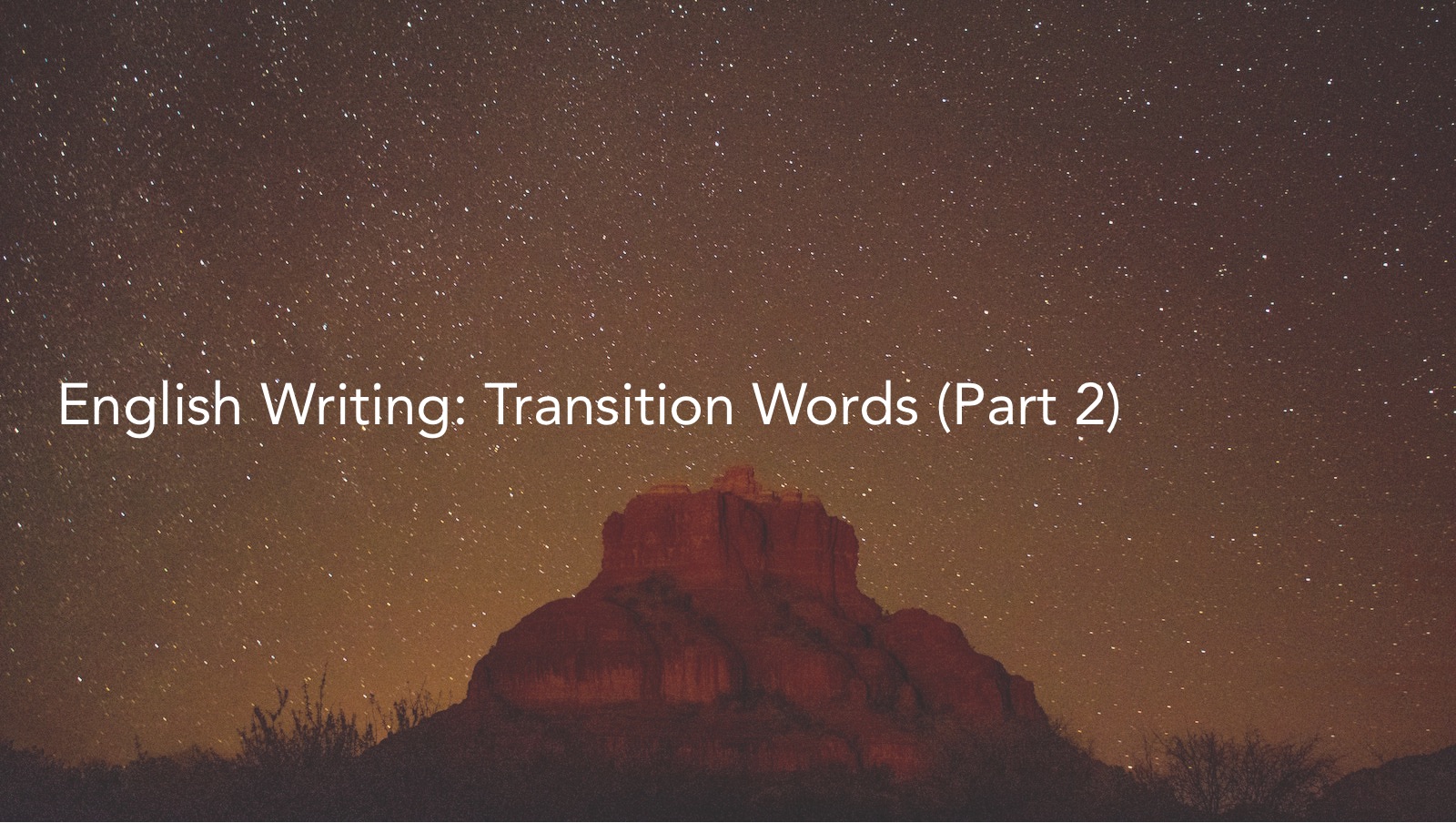English Writing: Transition Words (Part 2)

We learned from the previous article that transition words are essential in English writing. They serve as a bridge that connects one idea to another. It makes your story complete. And transitions create a smooth flow in your writing. a
As a reminder, we use them to:
- add information (moreover, in addition, etc.)
- show contrast or opposite ideas (although, however, but, etc.)
- show conditions (if, unless, etc.)
- arrive at a conclusion (therefore, thus, hence, etc.)
Proper use of transitions makes your essays enjoyable to read and easy to understand. In today’s lesson, we will talk about transitions that show a conclusion or result. These are:
- therefore
- thus
- consequently
- so
- then
- hence
- as a result
If you’re writing essays, especially for longer ones, you can use two of these or more: therefore, thus, consequently, and so.
Since transitions connect two ideas, what do we want to connect here? We show a logical conclusion. We want to connect a consequence after an action, behavior, or situation. So now, what is the result? It is basically a result. For example, when you make a decision or a choice, then you live with its consequences.
1) therefore (CONCLUSION): Use this when you have a premise. And from the premise, you generate a conclusion. A premise is something or an idea that we believe to be true, and because we believe that truth, we reach a conclusion. Therefore is not “because”. Therefore is a result and not a “cause”.
2) thus (RESULT): When you use this, something had to be mentioned before you can present the result.
3) consequently (CONSEQUENCE): Something had to happen before you can use this transition word.
There is a very slight difference in these three words, especially since these are the most commonly used ones in writing. They are all about something that happened before.
Remember to use ‘therefore’ when you emphasize a conclusion. Use ‘consequently’ or ‘thus’ when you want to highlight a result of something that happened before.
4) so: shows a consequence or result
5) then: also shows consequence or result
This happened, so I did this.
This happened, then I did that.
6) hence: This is not commonly used anymore, and it is old-fashioned. But if you must use it, you can use it instead of thus or therefore, to show a result.
7) as a result: very casual
All of these can be used in mid-sentence or to start a sentence. Here are examples:
- It’s raining, so I’ll bring my umbrella.
- The majority of the clients complained about the changes in the product. The company, therefore, decided to bring back the old features in the product.
- 93% of the class failed the test. Consequently, the professor did not record their scores.
(The commas are just for pace and pause. But, you are not required to use them.)
- Many accidents happen because of cracks and potholes on the road; thus, the City Engineers Office closed it down for a week to make repairs.
As you can see, you use the transitions in these sentences to show the direct link between an earlier event to its result.
In writing, if you have already used ‘therefore’, ‘consequently,’ and ‘thus’ in your paragraphs, you can begin using ‘so’ in the following paragraphs for variety. But also, DON’T uses ‘so’ too casually and start putting them all over the place.
MORE EXAMPLES
- The rain was pouring this morning, so only a few students came to school. Consequently, the teacher canceled the class and sent everyone home.
Don’t be afraid to use more than one transition in a paragraph. One sentence may show a situation, and the next sentence may show another situation that follows it.
Moreover, the word ‘so’ has many uses. Just make sure that you are using it properly to show the right relationship in your sentence.
The transition ‘then’ is useful in dialogues and conversations since it is very casual:
1.
John: Playing the violin is too difficult.
Teacher: Then spend more time practicing.
2.
Kate: I miss my Mom.
Kate’s friend: So let’s go visit her tonight.
3.
Ben didn’t prepare well for the interview. As a result, he didn’t get the job.
4. Children get bored quickly with their lessons. Therefore, the teachers need to use music, art, and games to get the children engaged more in class.
5. Their captain died in action, and consequently, the soldiers lost their will to fight
In our previous blog, we discussed transitions that show additional ideas (in addition, moreover, furthermore, etc.). Today, you learned about transitions showing conclusions and consequences. Try making your own sentences, and you may ask your LingualBox teacher to check them. Enjoy writing!
